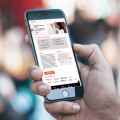Want to Start a Business? Check Out Mobile Health
— October 2, 2014In the last decade, the convergence of technology and healthcare has transformed patient care, creating a promising environment for startups eager to tackle complex health challenges. Innovations such as mobile health (“mHealth”) applications and consumer-oriented diagnostic tools are pushing the boundaries of what healthcare can achieve. This shift, driven by advancing mobile technologies and changing healthcare expectations, has opened doors to new solutions and opportunities.
The Power of mHealth: A Movement in Motion
One of the pioneers in this field, Dr. Eric Topol, a cardiologist and author, has explored the potential of mobile health technology. At the Scripps Clinic in San Diego, Topol has tested various devices that integrate with smartphones to offer on-the-go health solutions. One such tool is a magnifying lens that attaches to an iPhone, enabling high-resolution imaging of a patient’s ear canal. After piloting it at the clinic, Topol was impressed by its effectiveness. He believes these devices are not just conveniences but the first step toward a digital health revolution.
Topol isn’t alone in his optimism. The mHealth industry is rapidly evolving, fueled by the increasing adoption of mobile devices by both healthcare providers and patients. According to market projections, the demand for mHealth solutions could exceed $10 billion, highlighting the tremendous potential for startups to innovate in this space. With the growing availability of mobile technology, both healthcare providers and consumers expect health services to be as seamless and accessible as other tech-enabled aspects of their lives.
Unleashing Consumer Potential: mHealth in Action
The transition from traditional healthcare to a tech-integrated experience is still in its early stages. Devices like the CellScope Oto, designed to capture images of the inner ear, showcase the potential of consumer-oriented mHealth technology. Although it is not yet available for sale, the tool has exciting applications for parents. Instead of an office visit, parents could use the device to send images of their child’s ear infection directly to a pediatrician, who may then provide a remote diagnosis. For Topol, these advancements suggest that smartphones could become a primary source of patient health data—a role that was previously unthinkable.
In addition to individual devices, more comprehensive solutions are gaining traction. For example, Axial, developed by a healthcare software company in Raleigh, North Carolina, has created a system that connects patients, specialists, and primary care providers. Axial’s mobile platform offers patients a wealth of information about their conditions and medications, along with tools to track symptoms and medical records. Hospital specialists can monitor a patient’s progress remotely, creating a seamless continuum of care that follows the patient, whether they are at the hospital, home, or a doctor’s office.
Axial’s approach highlights a critical benefit of mHealth: data connectivity. Founded in 2009, the company now serves over 70 hospitals, integrating disparate sources of health data into a unified system. For hospitals, Axial’s platform reduces gaps in communication and provides medical professionals with a more holistic view of patient health. In a field often hindered by siloed data systems, this connectivity represents a crucial step toward more efficient and collaborative care.
High Hurdles in mHealth Innovation
While mHealth technology promises significant benefits, startups face considerable obstacles in entering this field. Topol notes that healthcare data often exists in isolated systems, each operating independently, making it challenging to implement integrated solutions. For new players, especially those without prior industry experience, this complex data landscape can be a daunting barrier.
In addition to technical challenges, regulatory hurdles also loom large. Startups in the health space must often contend with the scrutiny of the U.S. Food and Drug Administration (FDA). Chris Wasden, managing director at PricewaterhouseCoopers’ Healthcare Strategy and Innovation Practice, explains that FDA oversight can be intimidating for entrepreneurs. In response, some startups deliberately design products to avoid FDA regulations. However, Wasden cautions against sacrificing quality for the sake of ease, advising entrepreneurs to focus on developing effective solutions rather than evading regulatory attention.
“Ignore the FDA for now,” says Wasden, “and focus on designing something that’s really effective. If it’s a good solution, don’t be afraid to go through the approval process.” His advice underscores a critical tension in mHealth: innovation must balance speed with regulatory compliance, especially in fields like healthcare, where the stakes are high.
Achieving FDA Approval: The Case of Proteus
Startups that are willing to tackle regulatory challenges can reap significant rewards. Proteus, a mobile application development company, achieved FDA approval for a groundbreaking product: an ingestible sensor designed to monitor medication adherence. About the size of a grain of sand, this sensor communicates with a wearable patch after ingestion, sending alerts to caregivers and family members through an app. Despite its innovative nature, Proteus’ journey to approval was lengthy, taking four years from initial FDA engagement to final approval.
For Proteus, obtaining FDA approval was more than just a regulatory milestone; it was a validation of their commitment to patient-centric technology. Startups like Proteus demonstrate that perseverance and a willingness to navigate complex regulatory landscapes can lead to pioneering advancements with real-world impact.
The Expanding mHealth Market: Opportunities for New Players
As healthcare costs continue to rise, both governments and employers are seeking solutions that provide quality care at lower prices. This trend creates a substantial demand for efficient, consumer-friendly mHealth solutions. In response, some companies are developing services that allow patients to access healthcare without visiting a doctor’s office. One such company offers a subscription-based service for $80 to $120 per year, granting patients access to doctors via videoconferencing and email. Currently available in California, this model exemplifies a shift toward remote care that could reach patients nationwide.
Ryan McQuaid, co-founder of the company, brings a unique perspective to the mHealth industry. Formerly with AT&T, where he helped launch its mHealth platform, McQuaid left to pursue the flexibility of startup life. For him, the ability to move quickly and experiment is essential for success in a field where larger corporations may be more risk-averse. “Big companies like AT&T can’t risk their whole business on a new idea that might not work,” he says. “But that’s where startups have an edge.”
Vietnam’s Software Outsourcing: Entering the Global mHealth Game
Vietnam is gaining recognition as a hub for software outsourcing, with skilled developers and competitive costs attracting clients worldwide. For Vietnam software companies, mHealth represents an opportunity to enter a rapidly growing industry. By leveraging their expertise in mobile app development, these firms can provide valuable solutions that meet the demands of the global healthcare market.
Software development Vietnam companies have the chance to partner with mHealth startups, offering essential services such as app development, cloud integration, and data security. As mHealth continues to grow, collaborative opportunities between Vietnamese firms and healthcare innovators could lead to mutual success.
Furthermore, these companies can learn from established mHealth players like Axial and Proteus. By understanding regulatory challenges and the importance of data connectivity, Vietnamese firms can position themselves to create solutions that not only work well but also align with international standards. In doing so, they can contribute to advancing healthcare technology while solidifying Vietnam’s position in the global tech landscape.
Overcoming Challenges to Succeed in mHealth
While the mHealth field is promising, success requires overcoming substantial barriers. For Vietnam software companies entering this space, understanding FDA regulations and data privacy laws is crucial. Collaborating with healthcare providers in the U.S. and Europe may offer valuable insights, allowing Vietnamese firms to adapt their solutions to meet the stringent standards of international markets.
At the same time, startups and tech firms must recognize the importance of innovation in consumer-oriented mHealth products. By embracing patient-centric designs and focusing on accessibility, companies can create tools that empower users to take control of their health. This approach not only fosters consumer loyalty but also aligns with the broader trend toward preventive and personalized healthcare.
The Road Ahead: Transforming Healthcare with Technology
As technology and healthcare continue to converge, mHealth will remain a fertile ground for innovation. Startups that successfully navigate regulatory complexities, leverage emerging technologies, and prioritize the patient experience will be well-positioned to thrive. With an increasing demand for remote and accessible healthcare solutions, the potential impact of mHealth on the future of medicine is limitless.
In Vietnam and beyond, a new wave of healthcare innovation is underway, with companies of all sizes racing to make healthcare more efficient, accessible, and personalized. The journey may be challenging, but for those willing to take it on, the future is full of possibilities.







